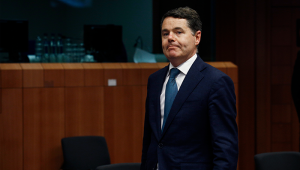At a meeting of the Eurogroup in Bratislava today, ministers also agreed on a number of “common principles” for the use of spending reviews including regular and transparent communication with the public and consistency with annual and multiannual budget planning.
Eurozone finance ministers consider spending reviews a “useful tool” for improving the quality of public finances, a statement said.
“They offer a complementary means of supporting fiscal responsibility through reviewing priorities in public expenditure, and can contribute to more growth-friendly composition of the budget.”
They also noted that spending reviews have “particular relevance” for the euro area, “where sound fiscal policies are a key matter of common interest and whose member states have chosen to closely coordinate fiscal policies”.
A 2014 European Commission report notes that spending reviews have become more widespread in the EU, with at least eight member states – the UK, the Netherlands, France, Italy, Ireland, Denmark, Spain and Sweden – all engaged or recently engaged in one form or another of spending review.
The financial crisis acted as a trigger for many countries to introduce spending reviews, such as France, which started conducting them in 2008.
The UK completed its first spending review in 1998, and currently undergoes spending reviews every four or five years, with the review covering the same period.
However, this year the OECD noted there could be more progress on the use of spending reviews in the euro area.
It noted that they are a complex tool requiring much cooperation between finance and spending ministries, and sustained high level political commitment for its recommendations to be translated into policy decisions, which perhaps explains their slower uptake compared to other fiscal and budgetary measures.
The Eurogroup also called for “strong and sustained” political commitment at a high national level throughout a spending review, in order to ensure it is successful implemented into meaningful reforms.
It added that the design and implementation of reviews should follow best practice, including establishing a clear strategic mandate, the use of pilots to build expertise, the provision of adequate resources and access to data and the use of fact-based analysis linking spending across budget and administrative structures to policy outcomes.
Monitoring and communication to the public on the progress and outcome of reviews should be “regular and transparent”, it continued, while reviews themselves should be subject to independent ex-post evaluation to facilitate learning.
Finally, it stressed the ambitions and conclusions of the review should be consistent with annual and multiannual budget planning, with the national fiscal framework including the principle of running regular reviews to inform budget making.
“In times of high public debt and historically low economic growth rates, there is more need than ever to ensure that taxpayers’ money is used efficiently. The Eurogroup therefore calls on euro area member states to actively use spending reviews.”













